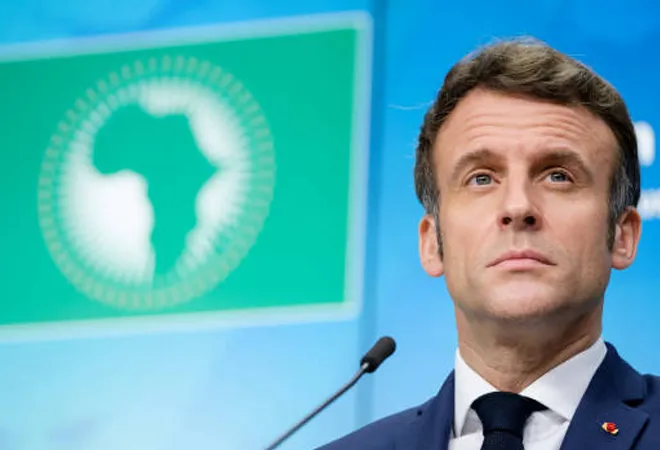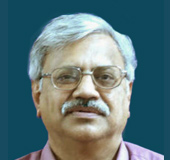-
CENTRES
Progammes & Centres
Location
Would Macron be able to quell the Jihadist movements in Africa as part of France’s Africa policy in his second term?

Emmanuel Macron was re-elected as the President of France on 24 April 2022, polling nearly 58.5 percent of the votes cast in the final round. After the elections, since the centrist forces led by Macron have lost more ground to the anti-immigrant far-right forces led by Le Pen, his political adversary, France appears to be more divided. In France’s multicultural society, there are roughly 6.8 million immigrants. Africa and African diaspora matter in France because there are 3 million French nationals of Sub-Saharan African origin that live in France as naturalised citizens and or/second-generation immigrants. Besides, France has an institutionalised relationship in economic, military, political, and cultural spheres with its erstwhile colonies in Sub-Saharan Africa after decolonisation in 1960. Macron, during his first Presidential term (2017–2022), ventured to give a new look to France’s Africa policy, and yet in Mali and the entire Sahel region, France was unable to handle the problem of the Jihadist terror effectively. Consequently, France was compelled to announce the withdrawal of its troops from Mali in February 2022. To get a clear picture of the Franco-African ties, it would be essential to highlight a few important features of Macron’s Africa policy before critically appraising the French policy concerning Mali in the Sahel region.
Macron, during his first Presidential term (2017–2022), ventured to give a new look to France’s Africa policy, and yet in Mali and the entire Sahel region, France was unable to handle the problem of the Jihadist terror effectively.
Since 2017, Macron has tried to shape France’s Africa policy by underscoring the fact that more than dominant-dependent ties France aspires to engage in strategic partnerships with African countries. He called French colonialism truly barbarous and a crime against humanity. To befriend Africans, Macron in May 2021, while apologising for the French role in the Rwandan genocide had conceded that France had failed to act when the genocide in Rwanda led to a loss of over 800,000 lives in 1994. Macron also expressed his desire to reform but not dismantle the CFA Franc. In substance, even if the former colonies have attained political sovereignty, they have had no monetary sovereignty because the French treasury exercises de facto control over the money supply owing to the link between the French Franc and the CFA Franc. The CFA Franc Zone encompasses 12 former French colonies in Africa and extends over an area of 965,000 square miles, which is nearly 80 percent of India. Further, Macron was the only European leader who went to attend the funeral of late President Idriss Déby of Chad, who was killed while fighting rebels, in April 2021. During the COVID-19 phase, France helped South Africa in boosting its vaccine capacity. Macron had also hosted the New France Africa Summit at Montpellier in October 2021, inviting artists, intellectuals, and entrepreneurs from civil society to revamp Franco-African rapports at the inter-societal level. Moreover, while France already has a military base in Djibouti, Macron, by advancing a US $1.5billion bridge loan to Sudan, successfully forged ties with Sudan which is also a strategically located state in the Horn of Africa. It needs to be underscored that due to institutionalised military ties with its former colonies, France has intervened militarily more than 50 times in different African countries during the past six decades. However, during the past few years, the problems emanating from Jihadist terrorism in the Sahel region, especially in Mali, have posed major challenges to France’s Africa policy.
The Sahel region is constituted of Mauritania, Mali, Chad, Niger, and Burkina Faso. Out of these countries, Mali has always enjoyed the central position because strategically it is situated at the crossroads between the former French West Africa and French North Africa. Although France has no direct economic stakes in Mali, it is involved in the adjacent countries. For instance, France gets uranium from Niger for its nuclear plants, the Franco-Belgian company Total gets one-third of its oil from the countries of the Gulf of Guinea. The French banks including Société Générale and BNP-Parisbas or companies such as Bouygues, Balloré, Orange S.A., and Eiffage have their presence in the region. Apart from protecting its 6,000 nationals in Mali, France has been keen to preserve its grip over key strategic minerals in the Sahel region where borders are porous and boundaries are non-existent.
The French banks including Société Générale and BNP-Parisbas or companies such as Bouygues, Balloré, Orange S.A., and Eiffage have their presence in the region.
Furthermore, after suffering setbacks in West Asia over the past decade, multinational terrorist outfits such as Al-Qaeda and the Islamic State (IS), through their affiliates, have been spreading their activities in the entire Sahel region. In 2012, the Malian military government failed to handle terror groups in the north such as the National Movement of the Liberation of Azawad (MNLA) of the Tuareg ethnic group that was aligned with Al-Qaeda and Ansar Dine. The Tuareg mercenaries who had seized weapons from Gaddafi took control of the north with the support of Al-Qaeda. Eventually, at the behest of the then military government, France under Hollande’s presidency intervened militarily in Mali, in 2013, as a major counterterrorism force against armed Islamists in northern Mali. France stationed roughly 5,000 troops in the Sahel region to wipe out the Jihadists from the map as it launched Operation Barkhane in the region. France also led counterterrorism forces of Sahel countries as well as the Takuba Task Force (TTK) of the European nations including Estonia, Denmark, Sweden, Italy, and the Czech republic. However, to counter the principal Jihadist groups in the Sahel region such as Ansaroul Islam (AI), Boko Haram (BH), Islamic State in the Greater Sahara (ISGS), an IS affiliate, and Jammat Nusrat al-Islam wal-Muslimin (JNIM), an Al-Qaeda affiliate, proved to be a formidable task in a politically volatile Sahel region.
Mali has been politically volatile due to inter-communal violence between farming and herding communities as well as terrorism in its northern parts. It witnessed two successive military coups in August 2020 and in May 2021, respectively. Since Col. Assimi Goita, who engineered both the coups, has shown reluctance to restore democratic processes, his regime has lost international trust, and the Economic Community of West African States (ECOWAS) imposed sanctions against Mali in December 2021. Due to Mali’s strategic location as well as the malfunctioning of the military regime, in 2021 alone there were 800 deadly attacks from the terrorist groups, killing thousands and displacing 2.5 million people while leaving 13 million people in need of humanitarian assistance in the region. According to the UN, nearly 600 civilians died in Mali in 2021. France lost 53 of its soldiers in the Sahel region out of these, 48 died in Mali. In April 2022, the Jihadists attacked three military bases in central Mali and Burkina Faso killing six soldiers. So far, the French troops, TTF of 800 men, troops from countries in the Sahel, excluding Chad, roughly 18,000 men from the United Nations Multidimensional Integrated Stabilization Mission in Mali (MINUSMA), and European Training Mission in Mali (EUTM) have not been able to bring about any difference on the ground. Consequently, France has become increasingly unpopular in Mali.
Due to Mali’s strategic location as well as the malfunctioning of the military regime, in 2021 alone there were 800 deadly attacks from the terrorist groups, killing thousands and displacing 2.5 million people while leaving 13 million people in need of humanitarian assistance in the region.
The Franco-Malian ties have worsened further because of Mali’s reluctance to resume democratic governance. Moreover, the request of Mali’s military junta for the withdrawal of Danish troops from the TTK prompted the French Foreign Minister Yves Le Drain to dub the Goita regime illegitimate. As a retaliatory measure, the Goita regime, playing the anti-colonial card, expelled the French ambassador within 72 hours from Mali. Although France intends to fight Jihadist terror from the adjacent countries of Mali by retaining 2,400 troops in the Sahel, Macron’s decision to withdraw troops from Mali has not been welcomed by the West African states such as Ivory Coast and Ghana owing to the fear that it will lead to destabilization of the entire region.
Besides, Macron also has expressed his reservations about the role of the Wagner group, a Russian private army closely connected to Kremlin, that is being deployed by the Malian junta to combat terrorism. Stephen Townsend, Head of the US Africa Command, believed that Mali was paying Wagner US$10 million a month partly in gold and partly in gemstones. Apart from the Russian fighter planes and arms, Russian geologists have also been working in Mali. Although President Putin has denied the link with 800 mercenaries of Wagner operating in Mali, this group is already operating in countries including Libya, Nigeria, Guinea, Central African Republics (CAR), Sudan, Zimbabwe, Mozambique, and Botswana. The dilemma before the Macron regime is that it can neither side with the military junta of Mali nor can it cooperate with the Wagner mercenaries to fight terror.
Despite how it might look, France still enjoys a preeminent position in its former colonies and is trying to expand its role further in other parts of Africa. Its failure in handling Jihadist terror in Mali has allowed Wagner (read Russia) to take full advantage of the worsening Franco-Malian ties to advance their interests in Mali and the Sahel region.
The views expressed above belong to the author(s). ORF research and analyses now available on Telegram! Click here to access our curated content — blogs, longforms and interviews.

Rajen Harshé is a founder and former Vice Chancellor of the Central University of Allahabad Prayagraj and former President of the G.B. Pant Social Science ...
Read More +